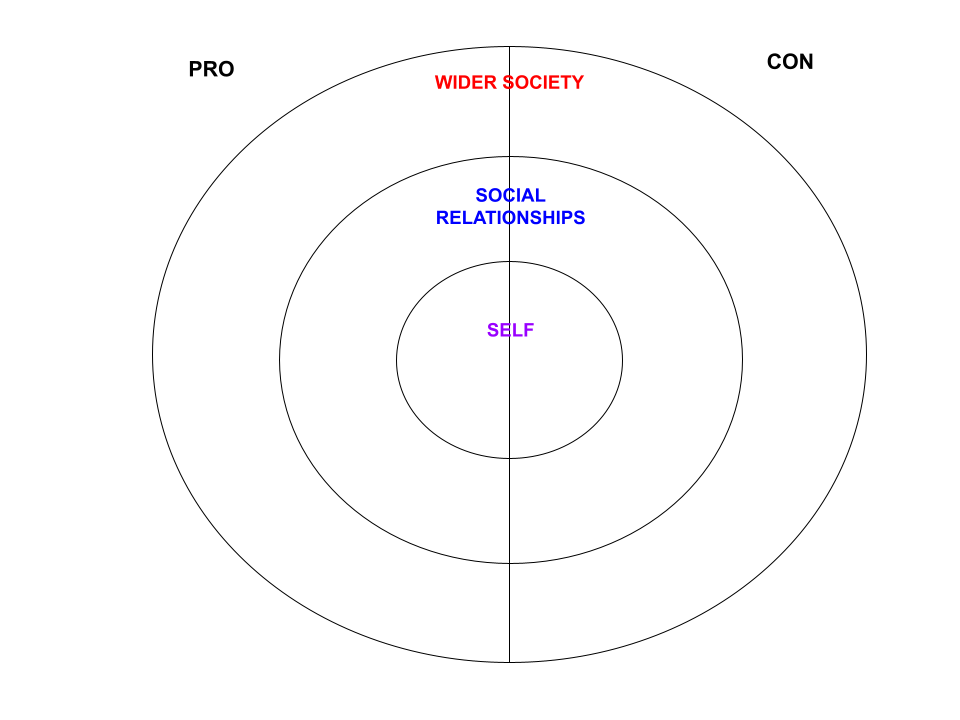Chapter 1: Ten Truths about Technology
A day (or more) without technology
Challenge yourself to put aside your phone, shut off your laptop, and ignore TikTok, Instagram, and Netflix. Zero technology for a full 24-hour period. If you need to, let your friends and family know you’ll be off the grid. Go about your day and observe how you manage the various functions for which you use technology: navigation (e.g., maps), communication (e.g., texting), entertainment. How does it feel? Check your reactions periodically. Does it seem to get easier? Does your experience with life change? Do you feel in a bit of a panic at times? Use the experience to understand the role technology plays in your life and, at the end of it, whether you’d make any changes.
Debate: Technology and the college learning experience
The use of laptops, tablets, and smartphones in college classrooms has become the norm. Classes are increasingly being delivered via video conferencing, especially during the COVID pandemic. The use of technology has many benefits to learning, yet there are also potential drawbacks. There are faculty who strongly oppose laptops in the classroom.
Assume your university is proposing a ban on using laptops in a classroom. Divide into groups: YES (those agreeing with the ban) and NO (those opposing), and prepare points supporting your stance. After sharing the main points on both sides, discuss what you’ve learned. Using the graphic below, with one side PRO and the other side CON, reflect on the use of laptops
- as individuals (pro/con).
- as groups (pro/con) — our use of technology is not inherently personal.
- as member of society — our use of technology is controlled and influenced by forces beyond us, including our households, our communities, our universities and employers, the larger society.
- What is the answer with regard to personal responsibility for our community’s technology use?
- With regard to technology in general, what recommendations do you have as a class for its safe and effective use?
Measuring technology use
With a group of at least four people, discuss how you individually use technology. Identify the types of devices you own/use, the applications you use, the functions they serve for you, the people you connect with, and the ways in which you use ICT during a week.
- Create a list of functions ICT provides to you. Match up the devices and applications that fulfill these functions.
- Observe the ways that you as individuals vary in your use — the number and type of devices, frequency of use, comfort with use, functions or purposes, and so on.
- As a group, design an instrument that would assess differences in technology use. What would you measure? How would you measure it?
The power of social media
This video is from the January 6 House Committee testimony of Stephen Ayres, given on July 12, 2022. Ayres protested at the Capitol on January 6, 2021, believing that the election had been stolen: https://www.nytimes.com/live/2022/07/12/us/jan-6-hearing-today-trump/29866d4b-e590-5573-b39a-535cf7f75f7c?smid=url-share
As you watch, you can see how Mr Ayres’ was influenced by what he read on social media, only later deciding to “do his own research” to understand the realities of the 2020 presidential election. What is your reaction to watching this video? How might you convince someone like Stephen Ayres to expand his sources of information beyond what he reads on social media?
Your relationship with technology
Each of us spends many hours each day with our phones, laptops, the internet, streaming services, social media, and more. You might say that we spend more time with technology each day than we do with any human being. And even if we don’t interact with technology, the fact that we carry our phones with us means that technology is “always with us.” Reflect on your use of technology over the day, and on your connection, interaction, and even intimacy with it. We are, in effect, in a relationship with our technology.
Reflect on that relationship as though it was with a person. Is it a relationship that makes you happy? It is one that you feel dependent on? One that might be jealous if you also spend time with humans in real life, with nature, with a book? Is it a relationship that you feel you might be losing some control with? Or is it clearly a consensual, co-dependent, cooperative relationship?
Maybe write a letter to technology, expressing how you feel about it.
Being Good Ancestors
Jonas Salk, pioneer of the polio vaccine, stated that the most important thing we can do is to be good ancestors. He refers to intentional actions that are forward thinking, and to preparing a world for future generations. One element that surrounds us is ‘smart cities.’ Thinking about the inevitability of technology innovation, if we want to be good ancestors, what do you think information and communications technology should do? Or not do? How can it be safe? For individuals and for society? Develop a list of recommendations for ICT innovators that look ahead to future families and individuals.


